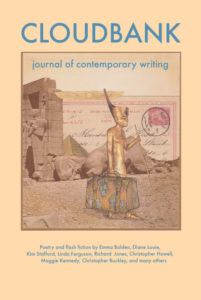
Cloudbank 10 includes poetry and flash fiction by Emma Bolden, Diane Louie, Kim Stafford, Linda Ferguson, Richard Jones, Christopher Howell, Maggie Kennedy, Christopher Buckley, and others. Bunch of Animals by Henry Hughes and Dark Energy by Robert Morgan are reviewed.
PRIZE WINNING FLASH FICTION
“On the Margin of the River” by Emma Bolden
The heaviest stones felt best to Agatha, felt most flat and balanced in her palm. Flat and balanced, she thought to herself, flat and balanced, with every unsteady step she took away from the party.
It was the party that had unsteadied her. It was, like most things in past tense, at first beautiful, at first all gin and juniper, all conversations chorused into rhythm with each other. She was wearing her June freckles and her August hat and even the orchids made her sweat. All night the lights seemed intent on sparkling. Eventually it became ruthless, that garden and all of its glitter and laughter, and the guests took on the sadnesses all guests take on as they approach the axis of goodbye. It started with the sky, with the inked corners of color soaking up from the horizon. She had so little time. All night, she had been gathering them, the heavy stones, the steadying stones. She couldn’t help it, couldn’t help her hands or her pockets.
Someone in the corner had been singing with the roses, just before she left, and the scent of the tune followed her. She knew it came with a full set of notes, a full set of lyrics. It was at once imperative and impossible for her to remember. She’d felt like this for six months, felt like the trailing vapor of a song, with and without a full set of notes and lyrics. Neither mattered now, she told herself. Inside of her body inked the illness, soaking upward from the place where she never made or carried a child. It was getting too close to September. She was getting close to the river. She could smell it, even if she couldn’t see it. In her pockets, the stones sang their notes to each other, and there was a sweetness to their crashing, as if all at once every fragment of the world at least gave an effort.
The song in the party’s corner had been a hymn, perhaps, about grace or salvation or a life heavied and steadied by its own hands. She took off her shoes so that she could feel the grass become bank and then shore. She wanted to feel it, all of everything and nothing. Or else the song had been about rest, about a long day inked into night. She had tried to listen. She had tried. The song was still in the voices behind her, she thought, or perhaps the voices were in the river. She would listen, when she reached the bottom. She would listen, and this time, she would hear.
Poets and writers in Cloudbank 10
Jeffrey Alfier
David Axelrod
Sarah Bokich
Emma Bolden
Bill Brown
Christopher Buckley
Dan Clark
Eduardo Chirinos
Hannah Craig
Ken DiMaggio
Deborah H. Doolittle
Jennifer Dorner
Barbara Drake
Damon Falke
Linda Ferguson
Timothy Geiger
Tim Gillespie
Leanne Grabel
John Harn
Andrea Hollander
Maggie Kennedy
Christopher Howell
Richard Jones
Louise Kantro
Lesli L’Angelle
Diane Louie
Betsy Martin
Michael Malan
Carla McGill
Geoffrey Miller
Thomas Mitchell
John Morrison
Jed Myers
Beth Paulson
Anne Pitkin
Cathy Porter
G. J. Racz
Carlos Reyes
Dennis Schmitz
Caitlin Scott
Mark Smith
Kim Stafford
Clemens Starck
George M. Steele
Robert Joe Stout
Robert Tremmel
Jeanne Wagner
Marty Walsh
Helen Wickes
Vincent Wixon